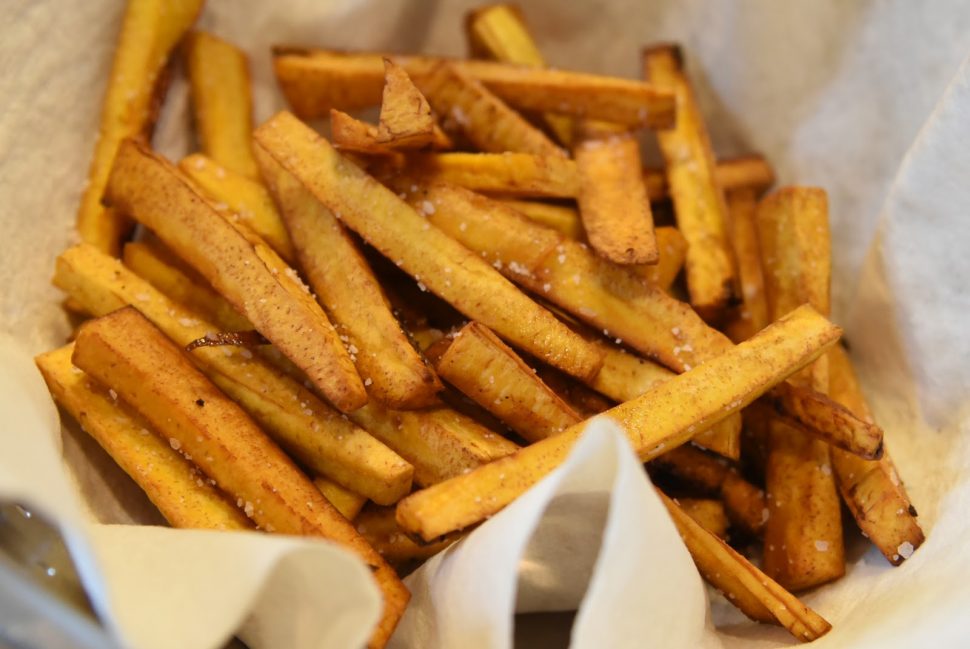After Sterling Products (SPL) had launched its packaged Plantain Fries at the April 2018 UNCAPPED event at the Sophia Auditorium it had – or at least so it seemed – appeared that this would be the latest really profound statement for the local agro-processing industry. At the time it was envisaged that plantains would gradually replace potato fries in the various fast food establishments and barbecues. SPL CEO and prime mover behind the various public/private sector-pushed agro-processing public events, Ramsay Ali, was already demonstrating an unmistakable enthusiasm about the market prospects for plantain fries, not only at home, but in the region as well.
It transpires that plantain fries remain popular at the level of many entertainment events where fish and chicken are served, though the market saturation dreams that had been dreamt by Sterling Pro-ducts, not least the likely supplanting of potato fries in the fast food joints have not materialised. The reason? Earlier this week the SPL boss told Stabroek Business on account of the fact that what had earlier been considered a price deal with farmers had, in effect, fallen through. “Unfortunately, SPL has put on hold the processing, packaging and distribution of Providence Plantain Fries,” the primary reason being “the fluctuation of the price of plantain from farmers.”
Ali, however, refuses to be fazed by what he considers to be a temporary setback. The portents, he believes, are more than promising given both the substantive popularity of plantain fries locally plus the fact that Guyana’s chilled potato fries import bill currently stands “in the vicinity of $650 million, the vast majority of frozen potato fries being imported by the growing number of fast food restaurants that have found their way into Guyana.” Accordingly, he adds, “the advent of plantain fries is an interesting yardstick with which to measure the success of the country’s import substitution programme.” Ali says he believes as well, that there is the potential of local plantain fries for making considerable headway into the regional market given what ought to be the product’s price competitiveness vis-à-vis extra-regional potato fries imported into the Caribbean.
The advent of the plantain fries, the SPL boss says, “is a response to both the growing popularity of plantains in the lunch kits of the nation’s schoolchildren as well as the increase in the size of a middle class that appears more and more comfortable with conveniently packaged foods.”
Shortly after his disclosure that SPL’s deal with the farmers had fallen through, he disclosed that “SPL has applied to the government for land for the cultivation of plantains, cassava, sweet potato and coconuts,” though he added that up until now the response has not been very positive.
Meanwhile, Ali says that while Guyana may not be anywhere close to the top of the regional pile as far as food imports are concerned, that ought not to diminish the country’s focus on re-directing the country’s foreign exchange expenditure by taking advantage of what our agricultural sector has to offer. He said that in the instance of SPL’s plantain fries initiative “it was a question of taking advantage of bountiful harvests and affordable prices on the one hand, and the value-added potential afforded by agro-processing, on the other.”
The advent of Plantain Fries, according to Ali, raises what he says has been an “age-old debate” in the country’s agricultural sector as to whether locally cultivated plantains produced at competitive prices do not represent “a compelling argument for cutting back on the considerable amounts spent on importing potatoes and more recently, potato fries. The focus of the discourse may have shifted somewhat with the advent of new initiatives to cultivate potatoes in commercial quantities. That, however, still does not remove the argument for doing more with plantains – at least that is the view of Sterling Products Ltd,” Ali said.
The CEO says the company is betting on both local farmers and consumers buying into the vision of adding value to plantains by simply presenting it to the market in a manner that is both pleasing and convenient. “Sterling believes that on the demand side there is a potentially lucrative gap to be filled,” he asserted.





